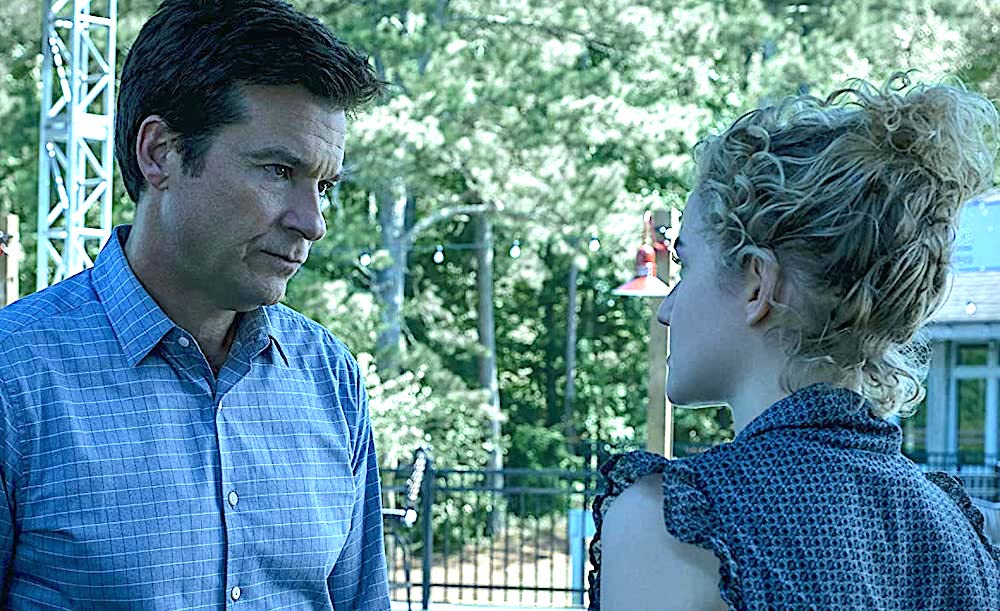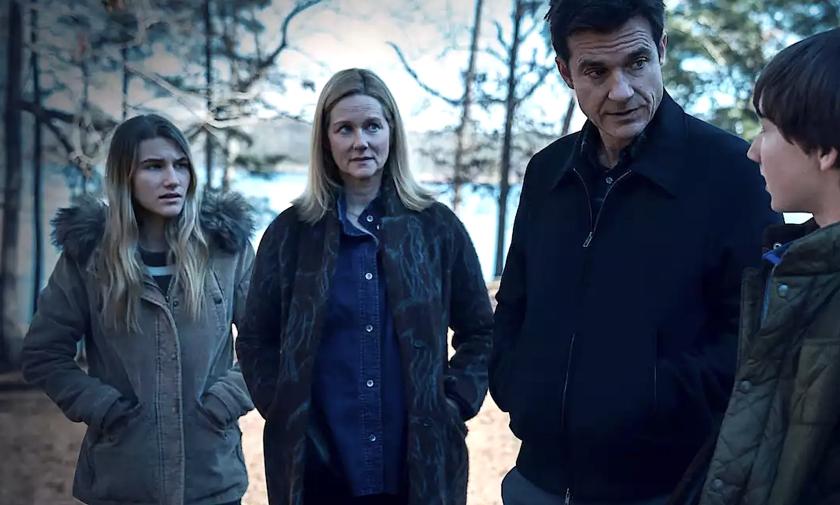While not the most headline-catching show on Netflix, Ozark has been steadily accruing critical accolades (including a couple of Emmys) and a devoted audience. Perhaps this superb third series will mark the tipping point where Ozark crosses over from cliqueishness to mass adulation.
It all began back with the first season in 2017, when Marty Byrde’s Chicago-based financial services company fell foul of their client, a Mexican drug cartel. Marty’s partner made the insane blunder of skimming off $8m of the cartel’s funds, which their company were supposed to be laundering. Long story short, a trail of carnage ensued, and Marty (Jason Bateman), wife Wendy (Laura Linney) and children Charlotte and Jonah only escaped with their lives thanks to Marty’s pledge to relocate to the Ozarks – a tourist-attracting region of lakes, mountains and hillbillies – and replace the stolen loot. The Ozarks, Marty had learned, was a propitious location for money-laundering.
 As season three opens, the Byrdes, having been on the brink of adopting new identities and fleeing to Australia at the end of series two, are now running their superficially respectable Missouri Bell casino operation with some success. Wendy is feeling so encouraged that she’s laying plans to buy up another casino, despite her husband’s opposition. They’re even launching a charitable Byrde family trust, ostensibly to “do some good” but really as a device for power-schmoozing with local fat-cats and politicians. For the moment at least, they seem to be viewed favourably by their intimidating Mexican overlord, Omar Navarro (Felix Solis), though he’s in the midst of a war with the rival Lagunas gang.
As season three opens, the Byrdes, having been on the brink of adopting new identities and fleeing to Australia at the end of series two, are now running their superficially respectable Missouri Bell casino operation with some success. Wendy is feeling so encouraged that she’s laying plans to buy up another casino, despite her husband’s opposition. They’re even launching a charitable Byrde family trust, ostensibly to “do some good” but really as a device for power-schmoozing with local fat-cats and politicians. For the moment at least, they seem to be viewed favourably by their intimidating Mexican overlord, Omar Navarro (Felix Solis), though he’s in the midst of a war with the rival Lagunas gang.
But in her attempts to remake herself as an influential player, and giving disturbing glimpses of a monster within, Wendy has overreached. She imagines the Byrdes’ successful handling of the cartel’s dirty money has given them some leverage with Navarro, but she soon learns it’s not that kind of relationship. You can’t bargain with a man like Navarro, a zero-sum player for whom profit is everything, you can only try to do whatever it takes to prevent him from murdering you. To keep the pressure on, he’s having the Byrdes supervised by his pet lawyer Helen Pierce (a chilling performance by Janet McTeer, pictured above), who doesn’t hesitate to deploy her tame hitman Nelson (Nelson Bonilla) against anyone who threatens the cartel’s interests.
What really gives Ozark its grip is its portrayal of the corrosive trickle-down effect of moral hazard, intimated in the show's frequently subdued lighting and hostile green-hell landscapes. Having once crossed the line and entered the outlaw zone of the drug gangs, nothing is ever the same and safety becomes a meaningless concept. The Byrdes had previously nearly split up when Wendy had an affair, but now the family has been forced together under the extreme pressure of a merciless criminal organisation, and attempts to escape are punishable by death (even if daughter Charlotte tried to legally emancipate herself from her parents in season two).
 All this has been knitted into a richly-layered depiction of a backwoods America which presents its own set of challenges. The locals like soaking the cash from the influx of playboys and college kids who frolic in the Ozarks’ lakes and woodlands, while simultaneously regarding them with a simmering loathing. The saga of the Byrdes’ relationship with the Langmores, a trailer-trash crime clan, has been bitter and blood-spattered. It has also produced one of the show’s standout characters in the petite but fiery Ruth Langmore (Julia Garner, pictured above with Bateman), who has managed to overcome the burden of her own gene pool to become Marty’s trusted casino manager. Equally unforgettable is Darlene Snell (Lisa Emery), a slightly deranged matriarch whose family have lived on this land for centuries. Darlene grows her own opium poppies and is a devout believer in Old Testament-style vengeance. She murdered her husband in series two, but only because he planned to murder her first.
All this has been knitted into a richly-layered depiction of a backwoods America which presents its own set of challenges. The locals like soaking the cash from the influx of playboys and college kids who frolic in the Ozarks’ lakes and woodlands, while simultaneously regarding them with a simmering loathing. The saga of the Byrdes’ relationship with the Langmores, a trailer-trash crime clan, has been bitter and blood-spattered. It has also produced one of the show’s standout characters in the petite but fiery Ruth Langmore (Julia Garner, pictured above with Bateman), who has managed to overcome the burden of her own gene pool to become Marty’s trusted casino manager. Equally unforgettable is Darlene Snell (Lisa Emery), a slightly deranged matriarch whose family have lived on this land for centuries. Darlene grows her own opium poppies and is a devout believer in Old Testament-style vengeance. She murdered her husband in series two, but only because he planned to murder her first.
Through all this, and with Linney playing a blinder alongside him, it might be possible to overlook Bateman’s brilliantly repressed performance as Marty Byrde. A genius with numbers and an obsessive-compulsive planner who leaves nothing to chance, he grasped from the start that his family’s only hope of survival lay in meticulous attention to detail. Even when being tortured by the Mexicans, having to accept yet another murder of somebody close to him or fending off the relentless probing of the FBI, he’s always considering the strategic picture and how the Byrdes can navigate through it. His emotions are expressed in the faintest tightening of his jaw, while his voice barely rises above a whisper even in moments of extreme duress. All in all, Ozark can look ahead to the next industry gong-giving season with confidence.















Add comment